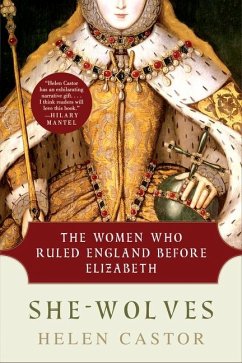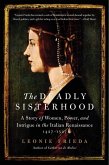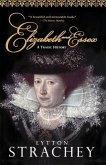When Edward VI died in 1553, the extraordinary fact was that there was no one left to claim the title of king of England. For the first time, England would have a reigning queen--but the question was which one: Katherine of Aragon's daughter, Mary; Anne Boleyn's daughter, Elizabeth; or one of their cousins, Lady Jane Grey or Mary, Queen of Scots. But female rule in England also had a past. Four hundred years before Edward's death, Matilda, daughter of Henry I and granddaughter of William the Conqueror, came tantalizingly close to securing the crown for herself. And between the twelfth and fifteenth centuries three more exceptional women--Eleanor of Aquitaine, Isabella of France, and Margaret of Anjou--discovered how much was possible if pre-sumptions of male rule were not confronted so explicitly--and just how quickly they might be vilified as "she-wolves" for their pains. The stories of these women, told here in all their vivid detail, expose the paradox that female heirs to the Tudor throne had no choice but to negotiate. Man was the head of woman, and the king was the head of all. How, then, could royal power lie in female hands?
With the death of Edward VI in 1553, England, for the first time, would have a reigning queen. The question was: Who? Four women stood upon the crest of history: Katherine of Aragon's daughter, Mary; Anne Boleyn's daughter, Elizabeth; Mary, Queen of Scots; and Lady Jane Grey. But over the centuries, other exceptional women had struggled to push the boundaries of their authority and influence?and been vilified as ?she-wolves? for their ambitions. Revealed in vivid detail, the stories of Eleanor of Aquitaine, Isabella of France, Margaret of Anjou, and the Empress Matilda expose the paradox that England's next female leaders would confront as the Tudor throne lay before them?man ruled woman, but these women sought to rule a nation.
With the death of Edward VI in 1553, England, for the first time, would have a reigning queen. The question was: Who? Four women stood upon the crest of history: Katherine of Aragon's daughter, Mary; Anne Boleyn's daughter, Elizabeth; Mary, Queen of Scots; and Lady Jane Grey. But over the centuries, other exceptional women had struggled to push the boundaries of their authority and influence?and been vilified as ?she-wolves? for their ambitions. Revealed in vivid detail, the stories of Eleanor of Aquitaine, Isabella of France, Margaret of Anjou, and the Empress Matilda expose the paradox that England's next female leaders would confront as the Tudor throne lay before them?man ruled woman, but these women sought to rule a nation.








